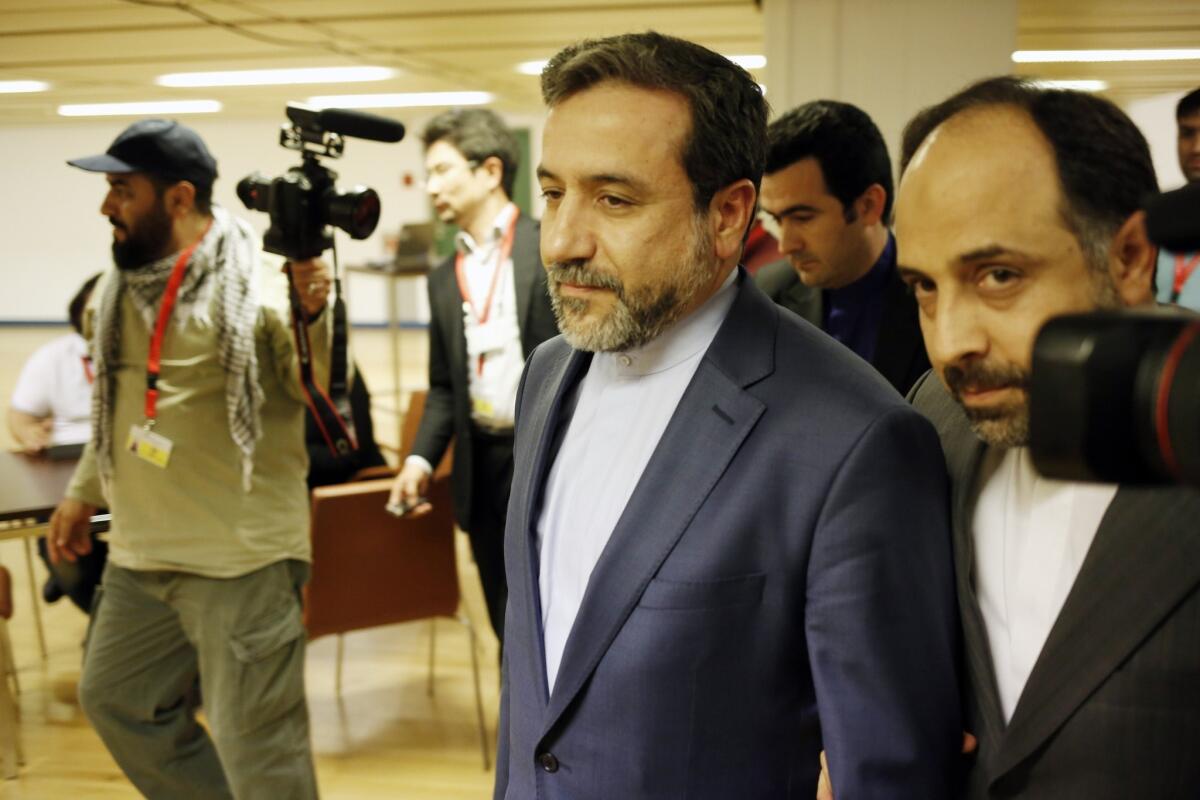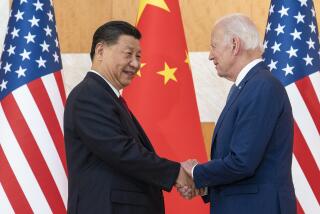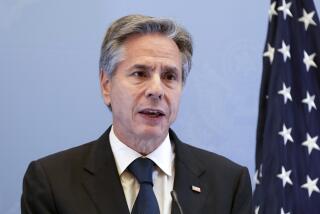U.S., Iranian officials to hold nuclear talks in Geneva next week

With nuclear talks stalled and a deadline approaching, a delegation of top U.S. officials will confer with Iranian counterparts at a hastily organized two-day meeting in Geneva next week, officials announced early Saturday.
Deputy Secretary of State William J. Burns and White House foreign policy aide Jacob Sullivan are joining Undersecretary of State Wendy Sherman and her regular contingent of negotiating specialists to meet the Iranians on Monday and Tuesday in Switzerland, officials said.
The meetings come “at an important juncture of the negotiations, and they will give us a timely opportunity to exchange views,” a senior administration official said in a statement. “We believe we need to engage in as much active diplomacy as we can, to test whether we can reach a diplomatic solution with Iran on its nuclear program.”
The official, who declined to be identified citing customary diplomatic ground rules, acknowledged that the sessions had not been long planned, though officials had anticipated there could be such bilateral sessions.
The meetings were described as “consultations” rather than “negotiations.”
Later Saturday, the European Union said officials of other states, and not just the Americans, would be involved in what it described as a new round of “intensified” talks.
Helga Schmid, the EU’s political director, will take part in the U.S.-Iran meeting, Michael Mann, a spokesman for EU foreign policy chief Catherine Ashton said in a statement.
Meetings between other states and the Iranians would follow, he said.
Negotiators for six world powers -- France, Britain, Germany, Russia, China and the United States -- and Iran have been pressing hard to complete by July 20 bargaining for a deal that will limit Iran’s nuclear program in exchange for a lifting of international economic sanctions.
Iran has always insisted that it is not seeking a nuclear weapons capability, although many countries dispute this.
The two sides remained far apart at their last high-level meeting in Vienna in May, raising questions about whether they would be able to meet the July deadline -- or seal the hoped-for pact at all.
Some diplomats have said in recent days that there have been private discussions about extending the negotiating deadlines, perhaps for a few months.
The six powers, known as the P5 Plus One, had earlier scheduled another round of high-level talks in Vienna from June 16 to June 20.
Analyst Cliff Kupchan said the U.S.-Iran meeting “tells us that the talks are troubled but that both sides want to do something about it.”
The administration is now sending its “ace negotiators,” which will add pressure on Iran to act, said Kupchan, a former State Department official who is with the Eurasia Group risk consulting firm.
The Iranians wouldn’t have agreed to meet if they had nothing new to say, he added, describing the news as “on balance, hopeful.”
Burns and Sullivan were central players in secret bilateral diplomatic talks with Iran that helped open the way to an interim nuclear deal that was signed last November in Geneva.
Burns, a respected diplomatic veteran, and Sullivan, a trusted West Wing aide, were brought in partly to assure the Iranians of the White House’s political commitment to try to make a deal.
President Obama continues to signal that reaching a deal is a top security priority, although he has also acknowledged that an agreement faces “long odds.”
The two sides reached a seeming impasse in May at a moment when they had completed preliminary work and began trying to write the actual text of the agreement.
They remained divided on core issues, such as how much of a uranium enrichment capacity Iran would retain after the deal. After the meeting, each side blamed the other for failing to move quickly enough.
Iranian officials continue to declare publicly that they will not give up key elements of their $100-billion nuclear infrastructure. If Iran does not agree to give up most of its inventory of centrifuges, the deal could be blocked by U.S. lawmakers, many of whom are skeptical of the negotiations.
U.S. officials have been insisting that the earlier U.S.-Iran talks -- which annoyed other members of the six-party group -- have ceased. Some analysts say they regret that this channel has been shut down, if it has, because Iran and the United States are the key players in the negotiations.
Bilateral sessions are a sensitive issue within the six-power group because other players don’t want to feel left out of the talks.
The senior administration official emphasized that the Geneva meetings would be held “within the context” of the six-party negotiations.
It has not been clear whether the current impasse represents normal negotiating theatrics or something more dire.
If the talks collapse, the Western powers would presumably increase the sanctions pressure on Iran’s faltering economy.
But Iran would also resume its nuclear development effort, taking it ever closer to a bomb-making capability.
More to Read
Start your day right
Sign up for Essential California for news, features and recommendations from the L.A. Times and beyond in your inbox six days a week.
You may occasionally receive promotional content from the Los Angeles Times.







